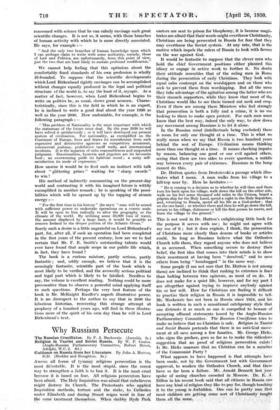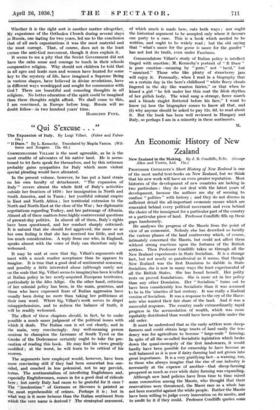Why Russians Persecute
The Russian Crucifixion. By F. A. Mackenzie. (Jarrolds. 2s.) Religion in Tsarist and Soviet Russia. By W. P. Coates.
(Anglo-Russian Parliamentary Committee, -Robert Street, Adelphi, W.C. 2. 6d.)
Guidance on Russia from her Literature. By John A. Hutton,
D.D. (Hodder and 'Stoughton. 3s.)
AMONG all formS of tyranny religious persecution is the most detestable.' It is the most stupid, since the surest way to Strengthen a faith is to ban it. It is the most cruel becatise it is based on fear. All religious persecutors have te-en afraid. The 1-1Oly Inquisition was afraid that Unbelievers might destroy its Church. The Protestants who applied inquisition .methoils, torture and the stake, to Catholics Under Eliiabeth and dtiring _Stuart reigns went in fear of thi same treatment themselves. When shabby Hyde Park
orators are sent to prison for blasphemy, it is because magis- trates are afraid that their words might overthrow Christianity, Christians are being persecuted in Russia for fear that they May overthrow the .Soviet systern. At any rate, that is the motive which impels the rulers of Russia to look with favour on the war against God.
• It would be fantastic to suppose that the clever men who
hold the chief Government positions either planned this idiocy or engage in active work to further it. No doubt their attitude resembles that of the ruling men in Rome during the persecution of early Christians. They "look with equal .calm contempt on the worshippers and on those who Seek to PreVent them from worshipping. But all the same they take advantage of the agitation among the latter who are
their staunch supporters, while they loloiv that most of the Christians would like to see them turned out neck and crop.
Even if -there are itimong -thern Ministers whd feel strongly that persecution is both a folly and a 'crime, it is no use looking to theirs to make open protest. For such men must know that the best way, indeed the only way, to slow down
any movement among Ruasians is to let it alone. In the Russian mind (intellectitals being excluded) there is room for only one thought at a time. This is what we really mean when we say that Russia is two hundred years behind the rest of Europe. Civilization means thinking more than one thought at a time. It means checking impulse by reason, balancing one good or one evil against others, seeing that there are two sides to every question, a middle way. between every pair of extremes. Russians in the lump cannot do this.
Dr. Hutton quotes frOm Dostoievski a passage which illus- trates what I mean. 'A man walks from his village to a hill-top near by. Here hehesitates
He is coming to .a decision as to whether he will then and there turn his babk upon his village, walk down the hill on the other side, Wilk on his feet some thousand odd miles to the Crimea, board a pilgrim ship for the Holy Land, spend a night in the Holy Sepulchre, and, returning to Russia, spend all his life as a God-seeker : that on the one hand ; or whether there and then he will go down the bill, return to his village, dishonour or kill the first person he meets, and hum the village to the ground."
This is not .used in Dr. Hutton's enlightening little book for
the purpose it serves with me ; he might not agree with my use of it ; but it does explain, I think, the persecution
of Christians more clearly than dozens of books or articles could. So long as Russians believe what the Orthodox Church tells them, they regard anyone who does not believe it as accursed. When something occurs to destroy their belief, the first idea that comes into their minds is to show their resentment at having been " deceived," and to save others from being " humbugged " in the same way. Some people (I am not sure that Dr. Hutton is not among them) are inclined to think that rushing to extremes is finer than halting between two opinions, as most of us do. It does not make for a quiet life, however, and for my part I
am altogether against trying to improve anybody against his or her will. How far Christians are finding it difficult to practise_ their religion in Russia it is impossible to tell. Mr. Mackenzie has not been in Russia since 1924, and his
book is written in such a sensational catchpenny style that one distrusts it as much as one is compelled to beware of accepting offhand statements issued by the Anglo-Russian Parliamentary Committee. The Russian Crucifixion tries to snake us believe that no Christian is safe. -Religion in Tsarist and Soviet Russia pretends that there is no anti-God move-
ment at all save among a few fanatics. Mr. George Hicks, who signs the preface, goes so far as to make the ridiculous suggestion that no proof of religious persecution exists ! Is Mr. Hicks unaware that no Christian can be a member of the Communist Party ?
What appears to have happened is that attempts have
been made, not by the Government but with Government approval, to weaken the Orthodox Church, and that theSe have so far been a failure. Mr. Arnold Bennett last 'year spoke of seeing churches crowded in Moscow. Dr. E. J.
Dillon in his recent book said that all Citizens in Russia can have any kind of religion they like to pay for, though teaching it to the yciung is forbidden. One can be pretty sure that Most children are getting some sort Of Christianity taught
them all the same.
Whether it is the right sort is another matter altogether. My experience of the Orthodox Church during several stays in Russia, one lasting for two years, led me to the conclusion that of all such organizations it was the most material and the most corrupt. That, of course, does not in the least excuse the anti-God movement, though it does explain it.
It seems to me a pity that the Soviet Government did not have the calm sense and courage to teach in their schools comparative religion. Why should not children be told that in all ages and lands men and women have hunted for some key to the mystery of life, have imagined a Supreme Being in various shapes, have believed in divine revelations, have in different ways worshipped and sought for communion with God ? There are beautiful and consoling thoughts in all religions. No better education of the spirit could be imagined than these thoughts might afford. We shall come to this, I am convinced, in Europe before long. Russia will no doubt follow—in two hundred years' time.
HAMILTON FYFE.





































 Previous page
Previous page